Methodological Critique of a Dissertation on Early Education
VerifiedAdded on 2020/05/04
|12
|3166
|261
Thesis and Dissertation
AI Summary
This dissertation methodological critique examines a study on early childhood education programs, focusing on the teacher-child bond to enhance adaptive skills and learning. The dissertation explores the impact of early education on children's success, the application of self-efficacy theory, and the importance of teacher-student and parent-child relationships. The research utilizes various data collection methods, including literature reviews, surveys, interviews, and case studies, employing descriptive analysis to interpret the findings. The critique highlights the strengths of the research design, particularly the qualitative approach, while acknowledging limitations such as a limited sample size and scope. The study emphasizes the role of positive interactions, social experiences, and challenging environments in fostering children's development and the significance of health, nutrition, and parental involvement in early education.
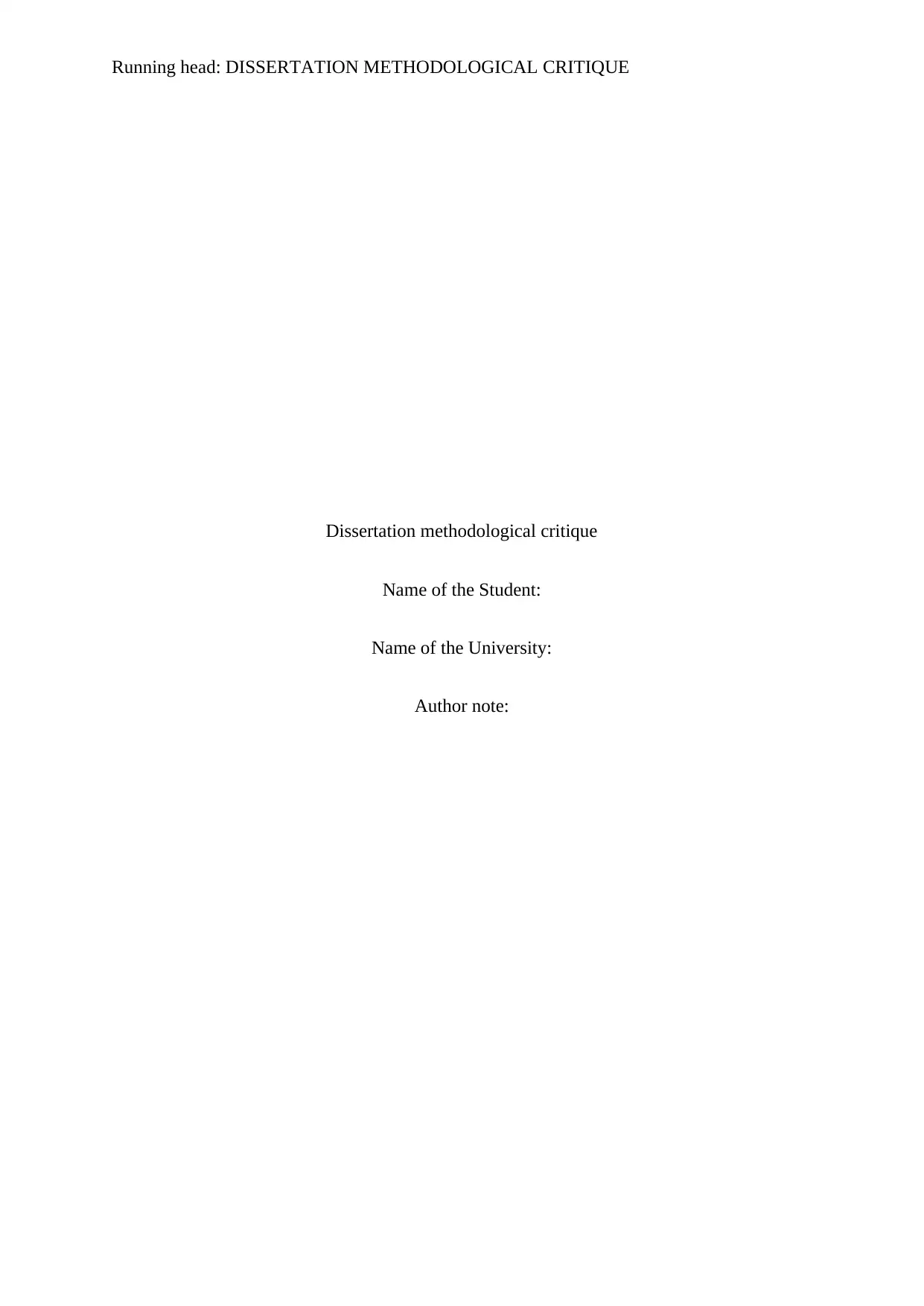
Running head: DISSERTATION METHODOLOGICAL CRITIQUE
Dissertation methodological critique
Name of the Student:
Name of the University:
Author note:
Dissertation methodological critique
Name of the Student:
Name of the University:
Author note:
Paraphrase This Document
Need a fresh take? Get an instant paraphrase of this document with our AI Paraphraser
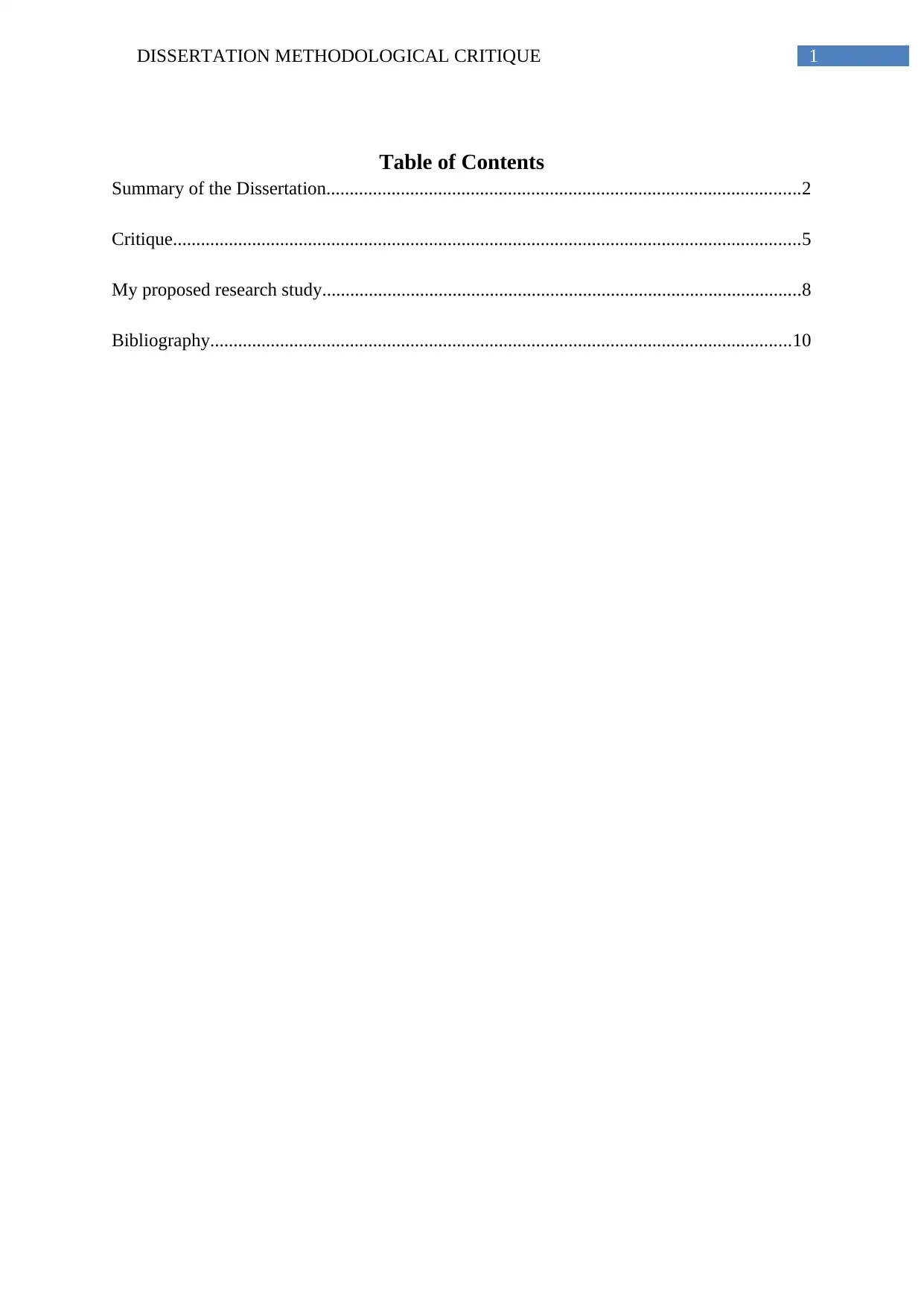
1DISSERTATION METHODOLOGICAL CRITIQUE
Table of Contents
Summary of the Dissertation......................................................................................................2
Critique.......................................................................................................................................5
My proposed research study.......................................................................................................8
Bibliography.............................................................................................................................10
Table of Contents
Summary of the Dissertation......................................................................................................2
Critique.......................................................................................................................................5
My proposed research study.......................................................................................................8
Bibliography.............................................................................................................................10
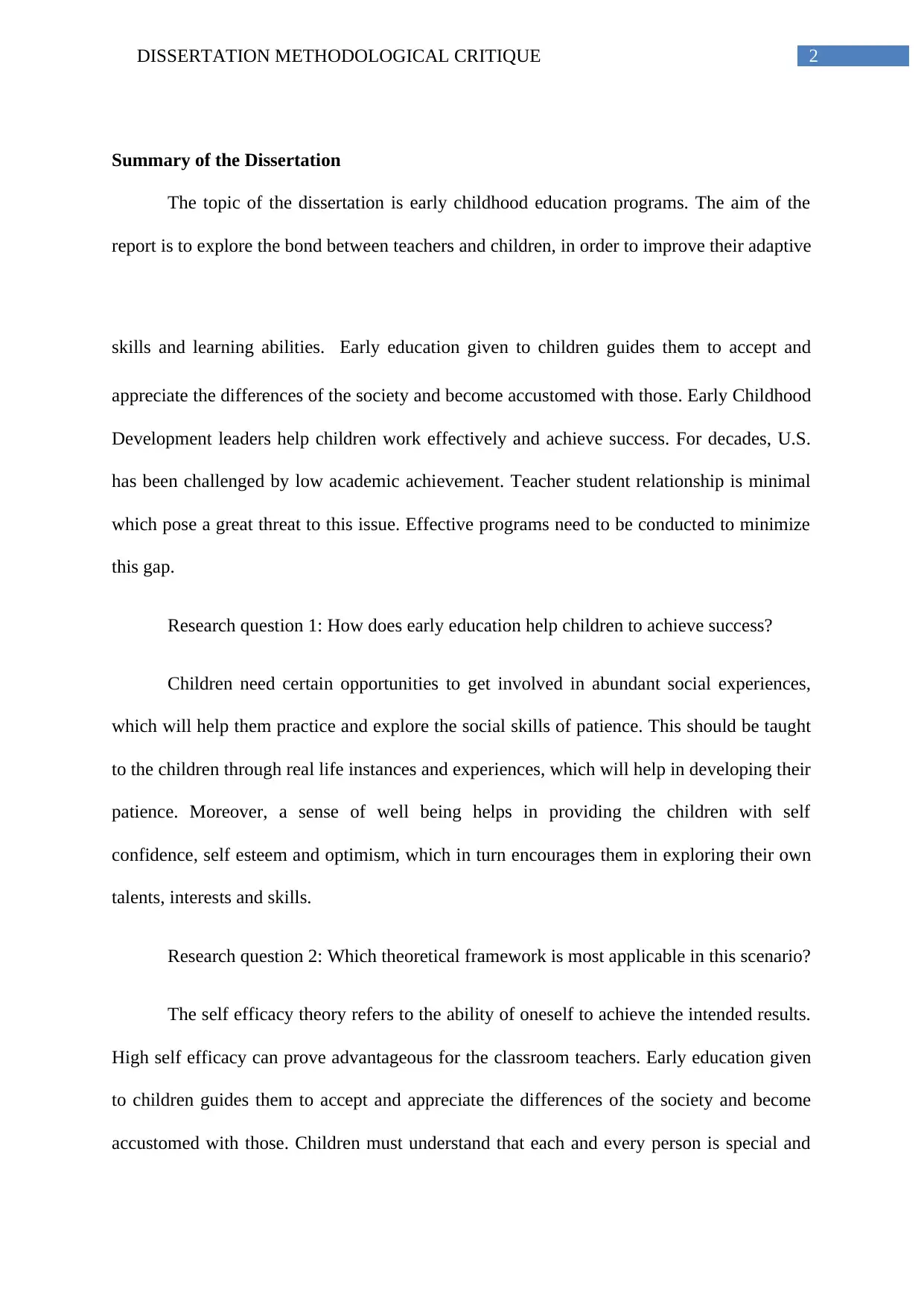
2DISSERTATION METHODOLOGICAL CRITIQUE
Summary of the Dissertation
The topic of the dissertation is early childhood education programs. The aim of the
report is to explore the bond between teachers and children, in order to improve their adaptive
skills and learning abilities. Early education given to children guides them to accept and
appreciate the differences of the society and become accustomed with those. Early Childhood
Development leaders help children work effectively and achieve success. For decades, U.S.
has been challenged by low academic achievement. Teacher student relationship is minimal
which pose a great threat to this issue. Effective programs need to be conducted to minimize
this gap.
Research question 1: How does early education help children to achieve success?
Children need certain opportunities to get involved in abundant social experiences,
which will help them practice and explore the social skills of patience. This should be taught
to the children through real life instances and experiences, which will help in developing their
patience. Moreover, a sense of well being helps in providing the children with self
confidence, self esteem and optimism, which in turn encourages them in exploring their own
talents, interests and skills.
Research question 2: Which theoretical framework is most applicable in this scenario?
The self efficacy theory refers to the ability of oneself to achieve the intended results.
High self efficacy can prove advantageous for the classroom teachers. Early education given
to children guides them to accept and appreciate the differences of the society and become
accustomed with those. Children must understand that each and every person is special and
Summary of the Dissertation
The topic of the dissertation is early childhood education programs. The aim of the
report is to explore the bond between teachers and children, in order to improve their adaptive
skills and learning abilities. Early education given to children guides them to accept and
appreciate the differences of the society and become accustomed with those. Early Childhood
Development leaders help children work effectively and achieve success. For decades, U.S.
has been challenged by low academic achievement. Teacher student relationship is minimal
which pose a great threat to this issue. Effective programs need to be conducted to minimize
this gap.
Research question 1: How does early education help children to achieve success?
Children need certain opportunities to get involved in abundant social experiences,
which will help them practice and explore the social skills of patience. This should be taught
to the children through real life instances and experiences, which will help in developing their
patience. Moreover, a sense of well being helps in providing the children with self
confidence, self esteem and optimism, which in turn encourages them in exploring their own
talents, interests and skills.
Research question 2: Which theoretical framework is most applicable in this scenario?
The self efficacy theory refers to the ability of oneself to achieve the intended results.
High self efficacy can prove advantageous for the classroom teachers. Early education given
to children guides them to accept and appreciate the differences of the society and become
accustomed with those. Children must understand that each and every person is special and
⊘ This is a preview!⊘
Do you want full access?
Subscribe today to unlock all pages.

Trusted by 1+ million students worldwide
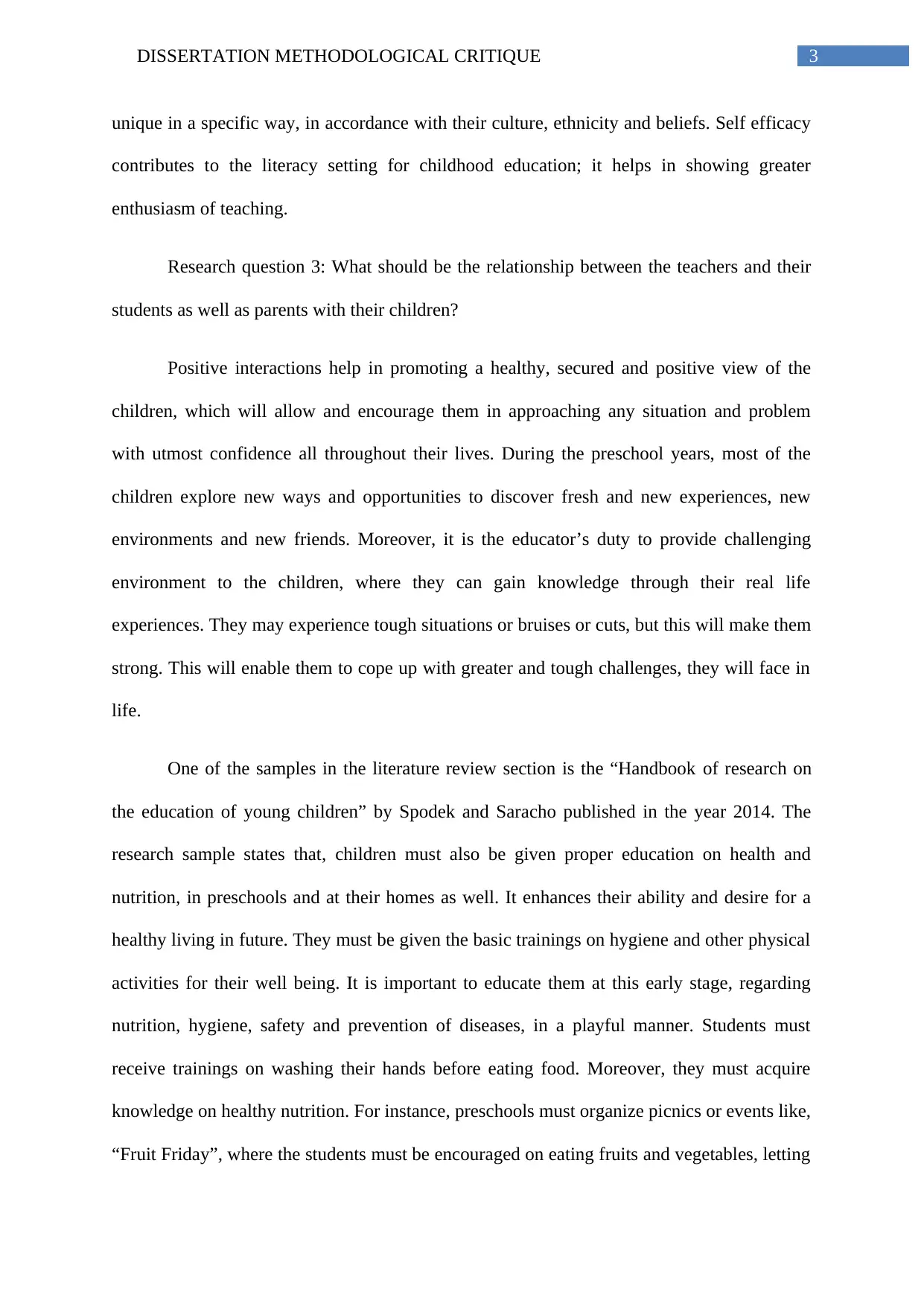
3DISSERTATION METHODOLOGICAL CRITIQUE
unique in a specific way, in accordance with their culture, ethnicity and beliefs. Self efficacy
contributes to the literacy setting for childhood education; it helps in showing greater
enthusiasm of teaching.
Research question 3: What should be the relationship between the teachers and their
students as well as parents with their children?
Positive interactions help in promoting a healthy, secured and positive view of the
children, which will allow and encourage them in approaching any situation and problem
with utmost confidence all throughout their lives. During the preschool years, most of the
children explore new ways and opportunities to discover fresh and new experiences, new
environments and new friends. Moreover, it is the educator’s duty to provide challenging
environment to the children, where they can gain knowledge through their real life
experiences. They may experience tough situations or bruises or cuts, but this will make them
strong. This will enable them to cope up with greater and tough challenges, they will face in
life.
One of the samples in the literature review section is the “Handbook of research on
the education of young children” by Spodek and Saracho published in the year 2014. The
research sample states that, children must also be given proper education on health and
nutrition, in preschools and at their homes as well. It enhances their ability and desire for a
healthy living in future. They must be given the basic trainings on hygiene and other physical
activities for their well being. It is important to educate them at this early stage, regarding
nutrition, hygiene, safety and prevention of diseases, in a playful manner. Students must
receive trainings on washing their hands before eating food. Moreover, they must acquire
knowledge on healthy nutrition. For instance, preschools must organize picnics or events like,
“Fruit Friday”, where the students must be encouraged on eating fruits and vegetables, letting
unique in a specific way, in accordance with their culture, ethnicity and beliefs. Self efficacy
contributes to the literacy setting for childhood education; it helps in showing greater
enthusiasm of teaching.
Research question 3: What should be the relationship between the teachers and their
students as well as parents with their children?
Positive interactions help in promoting a healthy, secured and positive view of the
children, which will allow and encourage them in approaching any situation and problem
with utmost confidence all throughout their lives. During the preschool years, most of the
children explore new ways and opportunities to discover fresh and new experiences, new
environments and new friends. Moreover, it is the educator’s duty to provide challenging
environment to the children, where they can gain knowledge through their real life
experiences. They may experience tough situations or bruises or cuts, but this will make them
strong. This will enable them to cope up with greater and tough challenges, they will face in
life.
One of the samples in the literature review section is the “Handbook of research on
the education of young children” by Spodek and Saracho published in the year 2014. The
research sample states that, children must also be given proper education on health and
nutrition, in preschools and at their homes as well. It enhances their ability and desire for a
healthy living in future. They must be given the basic trainings on hygiene and other physical
activities for their well being. It is important to educate them at this early stage, regarding
nutrition, hygiene, safety and prevention of diseases, in a playful manner. Students must
receive trainings on washing their hands before eating food. Moreover, they must acquire
knowledge on healthy nutrition. For instance, preschools must organize picnics or events like,
“Fruit Friday”, where the students must be encouraged on eating fruits and vegetables, letting
Paraphrase This Document
Need a fresh take? Get an instant paraphrase of this document with our AI Paraphraser
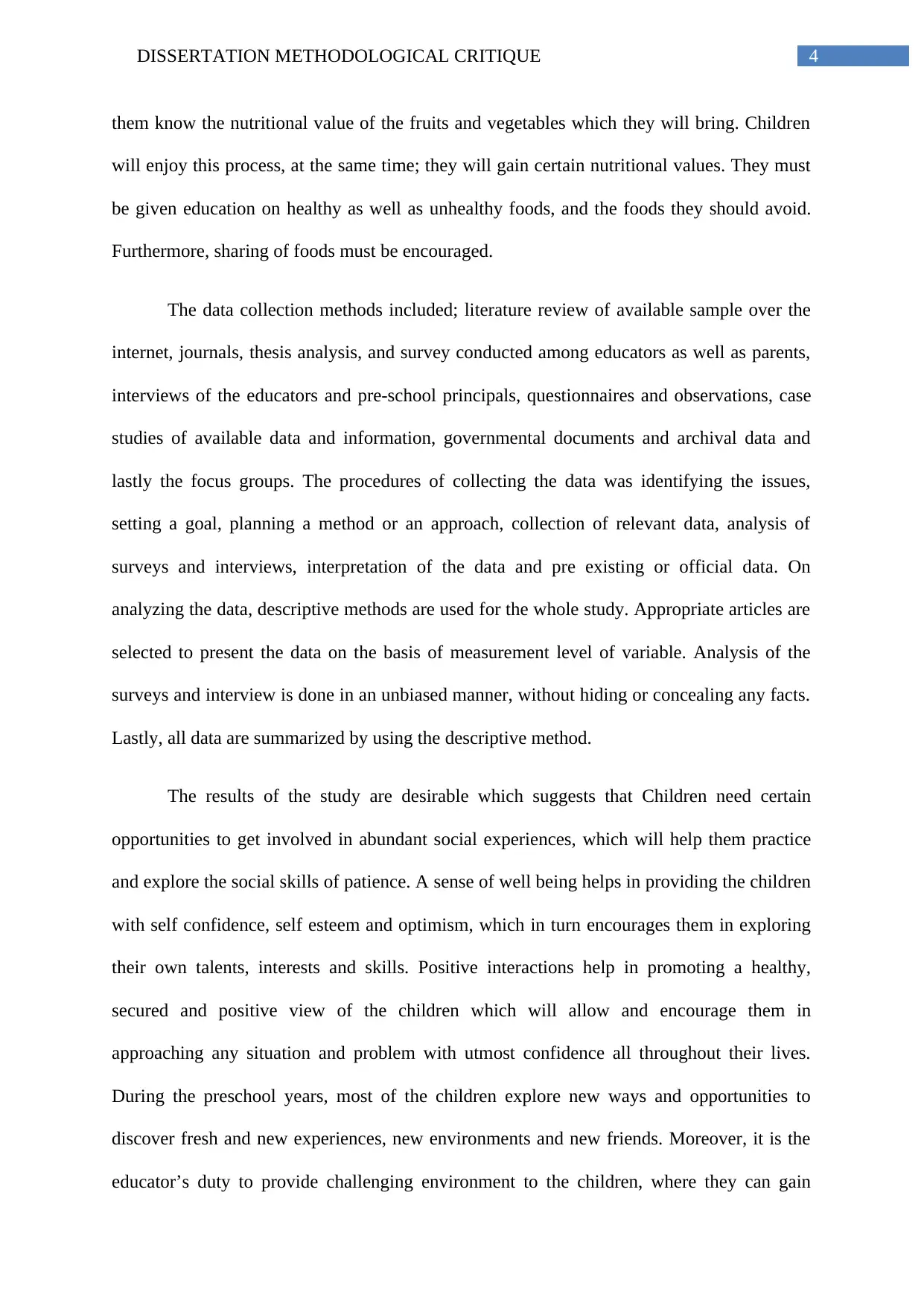
4DISSERTATION METHODOLOGICAL CRITIQUE
them know the nutritional value of the fruits and vegetables which they will bring. Children
will enjoy this process, at the same time; they will gain certain nutritional values. They must
be given education on healthy as well as unhealthy foods, and the foods they should avoid.
Furthermore, sharing of foods must be encouraged.
The data collection methods included; literature review of available sample over the
internet, journals, thesis analysis, and survey conducted among educators as well as parents,
interviews of the educators and pre-school principals, questionnaires and observations, case
studies of available data and information, governmental documents and archival data and
lastly the focus groups. The procedures of collecting the data was identifying the issues,
setting a goal, planning a method or an approach, collection of relevant data, analysis of
surveys and interviews, interpretation of the data and pre existing or official data. On
analyzing the data, descriptive methods are used for the whole study. Appropriate articles are
selected to present the data on the basis of measurement level of variable. Analysis of the
surveys and interview is done in an unbiased manner, without hiding or concealing any facts.
Lastly, all data are summarized by using the descriptive method.
The results of the study are desirable which suggests that Children need certain
opportunities to get involved in abundant social experiences, which will help them practice
and explore the social skills of patience. A sense of well being helps in providing the children
with self confidence, self esteem and optimism, which in turn encourages them in exploring
their own talents, interests and skills. Positive interactions help in promoting a healthy,
secured and positive view of the children which will allow and encourage them in
approaching any situation and problem with utmost confidence all throughout their lives.
During the preschool years, most of the children explore new ways and opportunities to
discover fresh and new experiences, new environments and new friends. Moreover, it is the
educator’s duty to provide challenging environment to the children, where they can gain
them know the nutritional value of the fruits and vegetables which they will bring. Children
will enjoy this process, at the same time; they will gain certain nutritional values. They must
be given education on healthy as well as unhealthy foods, and the foods they should avoid.
Furthermore, sharing of foods must be encouraged.
The data collection methods included; literature review of available sample over the
internet, journals, thesis analysis, and survey conducted among educators as well as parents,
interviews of the educators and pre-school principals, questionnaires and observations, case
studies of available data and information, governmental documents and archival data and
lastly the focus groups. The procedures of collecting the data was identifying the issues,
setting a goal, planning a method or an approach, collection of relevant data, analysis of
surveys and interviews, interpretation of the data and pre existing or official data. On
analyzing the data, descriptive methods are used for the whole study. Appropriate articles are
selected to present the data on the basis of measurement level of variable. Analysis of the
surveys and interview is done in an unbiased manner, without hiding or concealing any facts.
Lastly, all data are summarized by using the descriptive method.
The results of the study are desirable which suggests that Children need certain
opportunities to get involved in abundant social experiences, which will help them practice
and explore the social skills of patience. A sense of well being helps in providing the children
with self confidence, self esteem and optimism, which in turn encourages them in exploring
their own talents, interests and skills. Positive interactions help in promoting a healthy,
secured and positive view of the children which will allow and encourage them in
approaching any situation and problem with utmost confidence all throughout their lives.
During the preschool years, most of the children explore new ways and opportunities to
discover fresh and new experiences, new environments and new friends. Moreover, it is the
educator’s duty to provide challenging environment to the children, where they can gain
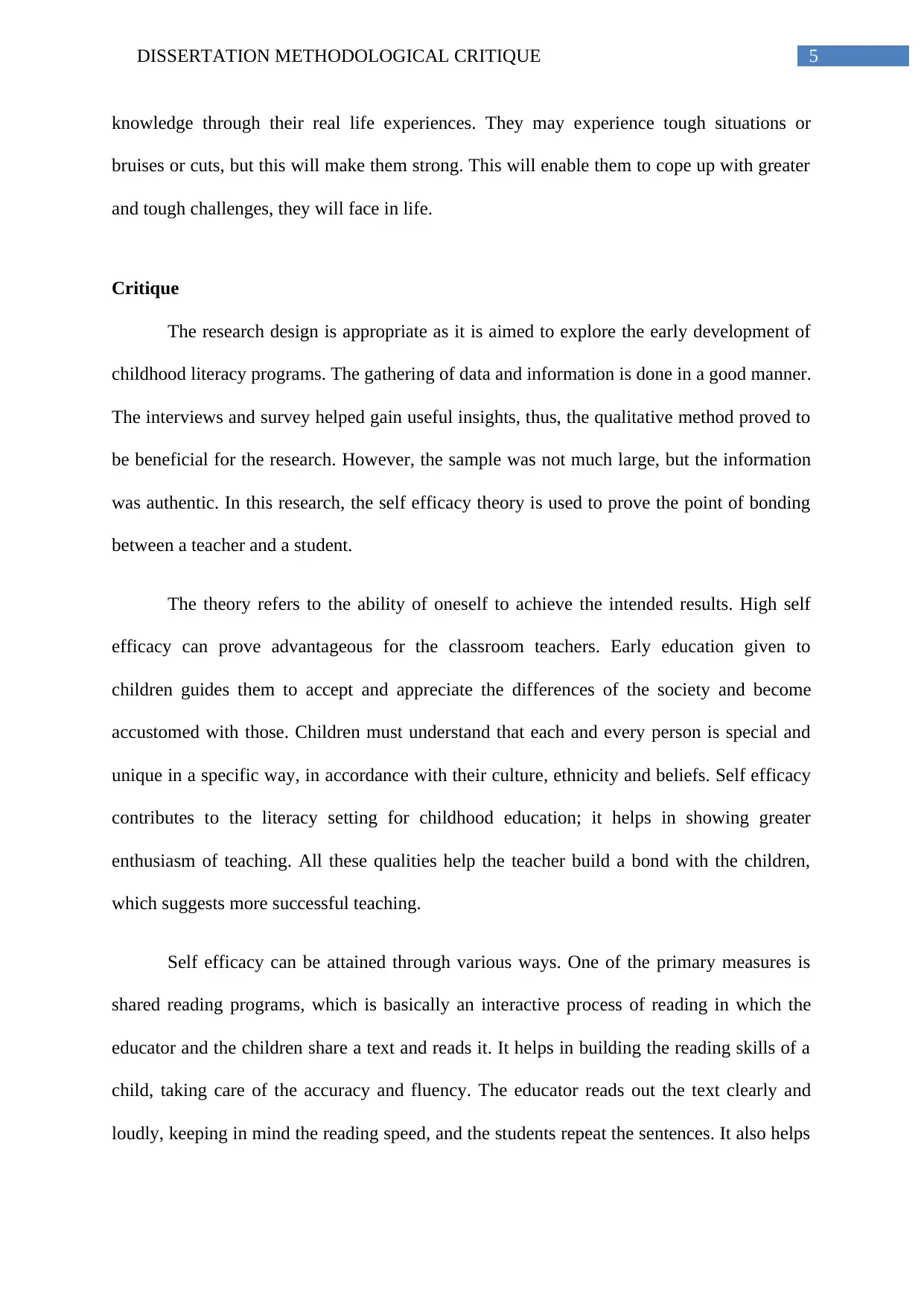
5DISSERTATION METHODOLOGICAL CRITIQUE
knowledge through their real life experiences. They may experience tough situations or
bruises or cuts, but this will make them strong. This will enable them to cope up with greater
and tough challenges, they will face in life.
Critique
The research design is appropriate as it is aimed to explore the early development of
childhood literacy programs. The gathering of data and information is done in a good manner.
The interviews and survey helped gain useful insights, thus, the qualitative method proved to
be beneficial for the research. However, the sample was not much large, but the information
was authentic. In this research, the self efficacy theory is used to prove the point of bonding
between a teacher and a student.
The theory refers to the ability of oneself to achieve the intended results. High self
efficacy can prove advantageous for the classroom teachers. Early education given to
children guides them to accept and appreciate the differences of the society and become
accustomed with those. Children must understand that each and every person is special and
unique in a specific way, in accordance with their culture, ethnicity and beliefs. Self efficacy
contributes to the literacy setting for childhood education; it helps in showing greater
enthusiasm of teaching. All these qualities help the teacher build a bond with the children,
which suggests more successful teaching.
Self efficacy can be attained through various ways. One of the primary measures is
shared reading programs, which is basically an interactive process of reading in which the
educator and the children share a text and reads it. It helps in building the reading skills of a
child, taking care of the accuracy and fluency. The educator reads out the text clearly and
loudly, keeping in mind the reading speed, and the students repeat the sentences. It also helps
knowledge through their real life experiences. They may experience tough situations or
bruises or cuts, but this will make them strong. This will enable them to cope up with greater
and tough challenges, they will face in life.
Critique
The research design is appropriate as it is aimed to explore the early development of
childhood literacy programs. The gathering of data and information is done in a good manner.
The interviews and survey helped gain useful insights, thus, the qualitative method proved to
be beneficial for the research. However, the sample was not much large, but the information
was authentic. In this research, the self efficacy theory is used to prove the point of bonding
between a teacher and a student.
The theory refers to the ability of oneself to achieve the intended results. High self
efficacy can prove advantageous for the classroom teachers. Early education given to
children guides them to accept and appreciate the differences of the society and become
accustomed with those. Children must understand that each and every person is special and
unique in a specific way, in accordance with their culture, ethnicity and beliefs. Self efficacy
contributes to the literacy setting for childhood education; it helps in showing greater
enthusiasm of teaching. All these qualities help the teacher build a bond with the children,
which suggests more successful teaching.
Self efficacy can be attained through various ways. One of the primary measures is
shared reading programs, which is basically an interactive process of reading in which the
educator and the children share a text and reads it. It helps in building the reading skills of a
child, taking care of the accuracy and fluency. The educator reads out the text clearly and
loudly, keeping in mind the reading speed, and the students repeat the sentences. It also helps
⊘ This is a preview!⊘
Do you want full access?
Subscribe today to unlock all pages.

Trusted by 1+ million students worldwide
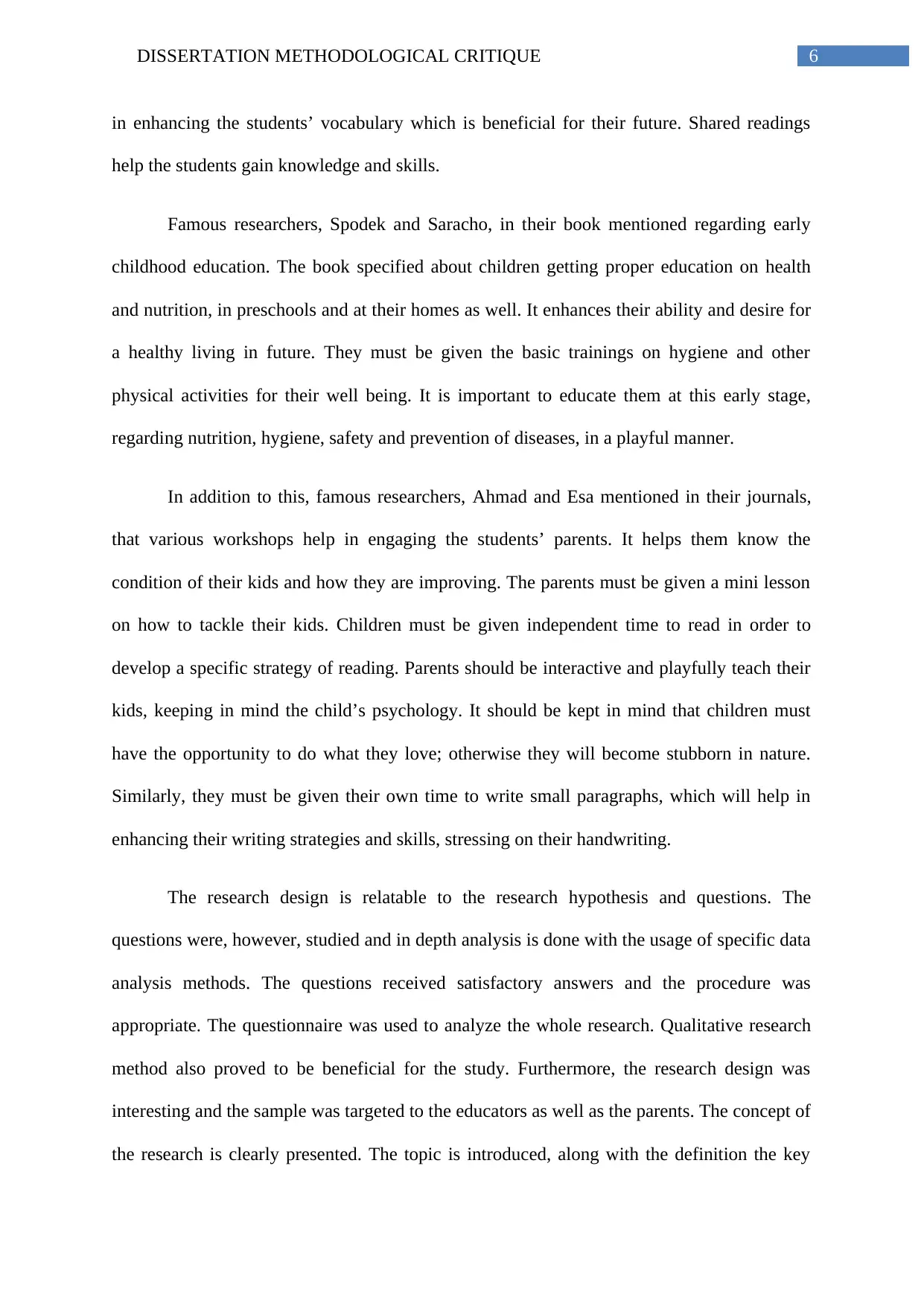
6DISSERTATION METHODOLOGICAL CRITIQUE
in enhancing the students’ vocabulary which is beneficial for their future. Shared readings
help the students gain knowledge and skills.
Famous researchers, Spodek and Saracho, in their book mentioned regarding early
childhood education. The book specified about children getting proper education on health
and nutrition, in preschools and at their homes as well. It enhances their ability and desire for
a healthy living in future. They must be given the basic trainings on hygiene and other
physical activities for their well being. It is important to educate them at this early stage,
regarding nutrition, hygiene, safety and prevention of diseases, in a playful manner.
In addition to this, famous researchers, Ahmad and Esa mentioned in their journals,
that various workshops help in engaging the students’ parents. It helps them know the
condition of their kids and how they are improving. The parents must be given a mini lesson
on how to tackle their kids. Children must be given independent time to read in order to
develop a specific strategy of reading. Parents should be interactive and playfully teach their
kids, keeping in mind the child’s psychology. It should be kept in mind that children must
have the opportunity to do what they love; otherwise they will become stubborn in nature.
Similarly, they must be given their own time to write small paragraphs, which will help in
enhancing their writing strategies and skills, stressing on their handwriting.
The research design is relatable to the research hypothesis and questions. The
questions were, however, studied and in depth analysis is done with the usage of specific data
analysis methods. The questions received satisfactory answers and the procedure was
appropriate. The questionnaire was used to analyze the whole research. Qualitative research
method also proved to be beneficial for the study. Furthermore, the research design was
interesting and the sample was targeted to the educators as well as the parents. The concept of
the research is clearly presented. The topic is introduced, along with the definition the key
in enhancing the students’ vocabulary which is beneficial for their future. Shared readings
help the students gain knowledge and skills.
Famous researchers, Spodek and Saracho, in their book mentioned regarding early
childhood education. The book specified about children getting proper education on health
and nutrition, in preschools and at their homes as well. It enhances their ability and desire for
a healthy living in future. They must be given the basic trainings on hygiene and other
physical activities for their well being. It is important to educate them at this early stage,
regarding nutrition, hygiene, safety and prevention of diseases, in a playful manner.
In addition to this, famous researchers, Ahmad and Esa mentioned in their journals,
that various workshops help in engaging the students’ parents. It helps them know the
condition of their kids and how they are improving. The parents must be given a mini lesson
on how to tackle their kids. Children must be given independent time to read in order to
develop a specific strategy of reading. Parents should be interactive and playfully teach their
kids, keeping in mind the child’s psychology. It should be kept in mind that children must
have the opportunity to do what they love; otherwise they will become stubborn in nature.
Similarly, they must be given their own time to write small paragraphs, which will help in
enhancing their writing strategies and skills, stressing on their handwriting.
The research design is relatable to the research hypothesis and questions. The
questions were, however, studied and in depth analysis is done with the usage of specific data
analysis methods. The questions received satisfactory answers and the procedure was
appropriate. The questionnaire was used to analyze the whole research. Qualitative research
method also proved to be beneficial for the study. Furthermore, the research design was
interesting and the sample was targeted to the educators as well as the parents. The concept of
the research is clearly presented. The topic is introduced, along with the definition the key
Paraphrase This Document
Need a fresh take? Get an instant paraphrase of this document with our AI Paraphraser
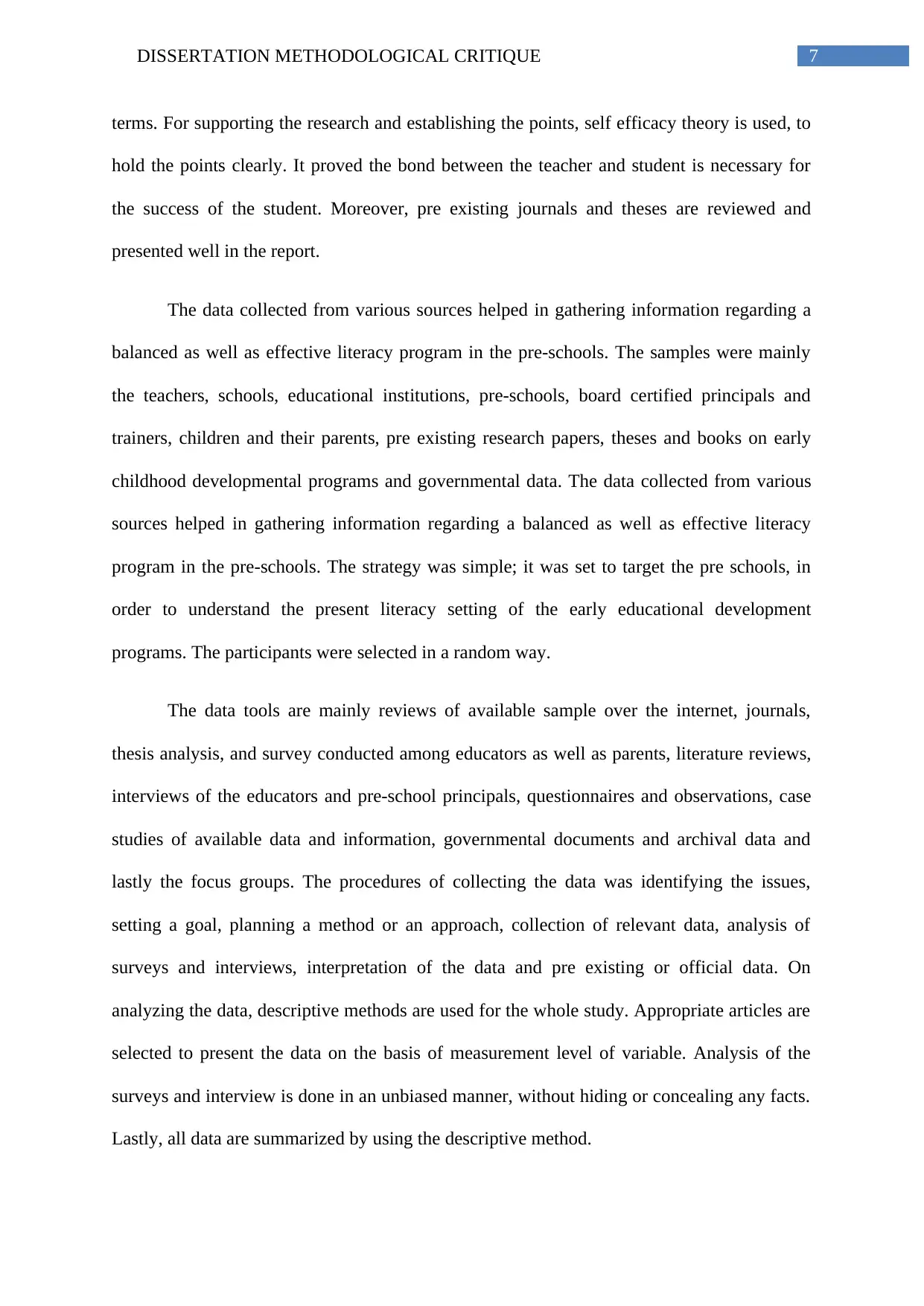
7DISSERTATION METHODOLOGICAL CRITIQUE
terms. For supporting the research and establishing the points, self efficacy theory is used, to
hold the points clearly. It proved the bond between the teacher and student is necessary for
the success of the student. Moreover, pre existing journals and theses are reviewed and
presented well in the report.
The data collected from various sources helped in gathering information regarding a
balanced as well as effective literacy program in the pre-schools. The samples were mainly
the teachers, schools, educational institutions, pre-schools, board certified principals and
trainers, children and their parents, pre existing research papers, theses and books on early
childhood developmental programs and governmental data. The data collected from various
sources helped in gathering information regarding a balanced as well as effective literacy
program in the pre-schools. The strategy was simple; it was set to target the pre schools, in
order to understand the present literacy setting of the early educational development
programs. The participants were selected in a random way.
The data tools are mainly reviews of available sample over the internet, journals,
thesis analysis, and survey conducted among educators as well as parents, literature reviews,
interviews of the educators and pre-school principals, questionnaires and observations, case
studies of available data and information, governmental documents and archival data and
lastly the focus groups. The procedures of collecting the data was identifying the issues,
setting a goal, planning a method or an approach, collection of relevant data, analysis of
surveys and interviews, interpretation of the data and pre existing or official data. On
analyzing the data, descriptive methods are used for the whole study. Appropriate articles are
selected to present the data on the basis of measurement level of variable. Analysis of the
surveys and interview is done in an unbiased manner, without hiding or concealing any facts.
Lastly, all data are summarized by using the descriptive method.
terms. For supporting the research and establishing the points, self efficacy theory is used, to
hold the points clearly. It proved the bond between the teacher and student is necessary for
the success of the student. Moreover, pre existing journals and theses are reviewed and
presented well in the report.
The data collected from various sources helped in gathering information regarding a
balanced as well as effective literacy program in the pre-schools. The samples were mainly
the teachers, schools, educational institutions, pre-schools, board certified principals and
trainers, children and their parents, pre existing research papers, theses and books on early
childhood developmental programs and governmental data. The data collected from various
sources helped in gathering information regarding a balanced as well as effective literacy
program in the pre-schools. The strategy was simple; it was set to target the pre schools, in
order to understand the present literacy setting of the early educational development
programs. The participants were selected in a random way.
The data tools are mainly reviews of available sample over the internet, journals,
thesis analysis, and survey conducted among educators as well as parents, literature reviews,
interviews of the educators and pre-school principals, questionnaires and observations, case
studies of available data and information, governmental documents and archival data and
lastly the focus groups. The procedures of collecting the data was identifying the issues,
setting a goal, planning a method or an approach, collection of relevant data, analysis of
surveys and interviews, interpretation of the data and pre existing or official data. On
analyzing the data, descriptive methods are used for the whole study. Appropriate articles are
selected to present the data on the basis of measurement level of variable. Analysis of the
surveys and interview is done in an unbiased manner, without hiding or concealing any facts.
Lastly, all data are summarized by using the descriptive method.
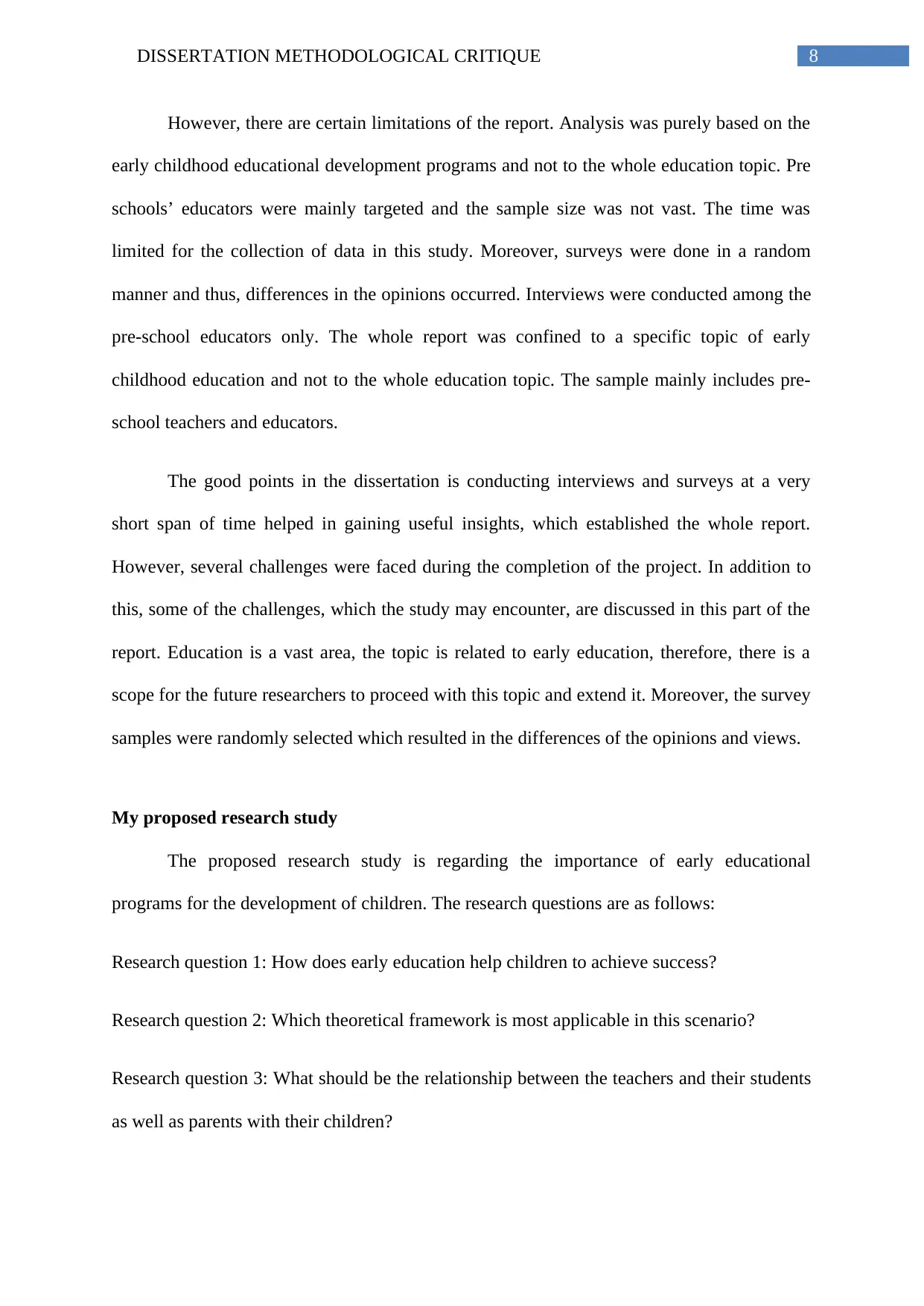
8DISSERTATION METHODOLOGICAL CRITIQUE
However, there are certain limitations of the report. Analysis was purely based on the
early childhood educational development programs and not to the whole education topic. Pre
schools’ educators were mainly targeted and the sample size was not vast. The time was
limited for the collection of data in this study. Moreover, surveys were done in a random
manner and thus, differences in the opinions occurred. Interviews were conducted among the
pre-school educators only. The whole report was confined to a specific topic of early
childhood education and not to the whole education topic. The sample mainly includes pre-
school teachers and educators.
The good points in the dissertation is conducting interviews and surveys at a very
short span of time helped in gaining useful insights, which established the whole report.
However, several challenges were faced during the completion of the project. In addition to
this, some of the challenges, which the study may encounter, are discussed in this part of the
report. Education is a vast area, the topic is related to early education, therefore, there is a
scope for the future researchers to proceed with this topic and extend it. Moreover, the survey
samples were randomly selected which resulted in the differences of the opinions and views.
My proposed research study
The proposed research study is regarding the importance of early educational
programs for the development of children. The research questions are as follows:
Research question 1: How does early education help children to achieve success?
Research question 2: Which theoretical framework is most applicable in this scenario?
Research question 3: What should be the relationship between the teachers and their students
as well as parents with their children?
However, there are certain limitations of the report. Analysis was purely based on the
early childhood educational development programs and not to the whole education topic. Pre
schools’ educators were mainly targeted and the sample size was not vast. The time was
limited for the collection of data in this study. Moreover, surveys were done in a random
manner and thus, differences in the opinions occurred. Interviews were conducted among the
pre-school educators only. The whole report was confined to a specific topic of early
childhood education and not to the whole education topic. The sample mainly includes pre-
school teachers and educators.
The good points in the dissertation is conducting interviews and surveys at a very
short span of time helped in gaining useful insights, which established the whole report.
However, several challenges were faced during the completion of the project. In addition to
this, some of the challenges, which the study may encounter, are discussed in this part of the
report. Education is a vast area, the topic is related to early education, therefore, there is a
scope for the future researchers to proceed with this topic and extend it. Moreover, the survey
samples were randomly selected which resulted in the differences of the opinions and views.
My proposed research study
The proposed research study is regarding the importance of early educational
programs for the development of children. The research questions are as follows:
Research question 1: How does early education help children to achieve success?
Research question 2: Which theoretical framework is most applicable in this scenario?
Research question 3: What should be the relationship between the teachers and their students
as well as parents with their children?
⊘ This is a preview!⊘
Do you want full access?
Subscribe today to unlock all pages.

Trusted by 1+ million students worldwide
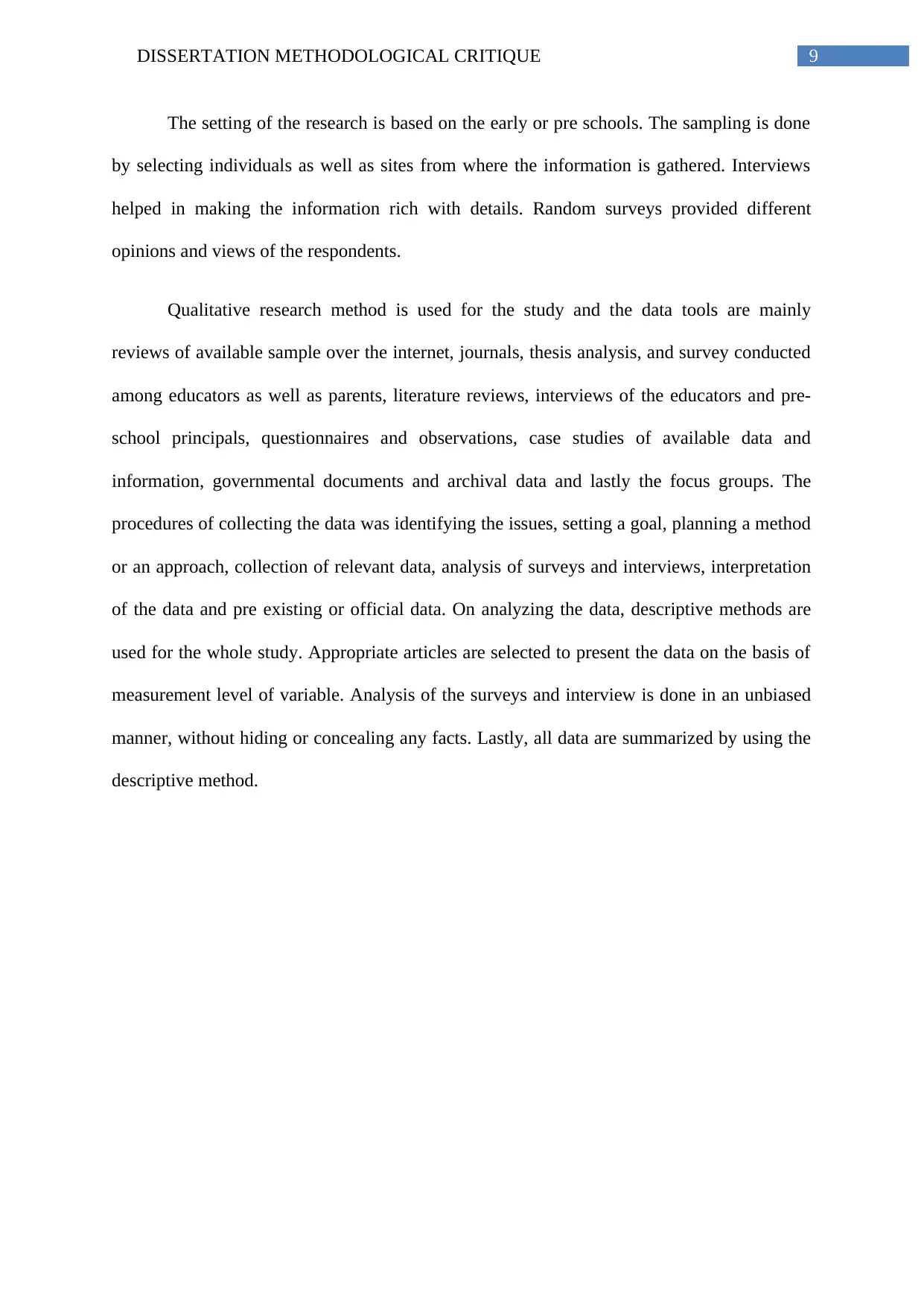
9DISSERTATION METHODOLOGICAL CRITIQUE
The setting of the research is based on the early or pre schools. The sampling is done
by selecting individuals as well as sites from where the information is gathered. Interviews
helped in making the information rich with details. Random surveys provided different
opinions and views of the respondents.
Qualitative research method is used for the study and the data tools are mainly
reviews of available sample over the internet, journals, thesis analysis, and survey conducted
among educators as well as parents, literature reviews, interviews of the educators and pre-
school principals, questionnaires and observations, case studies of available data and
information, governmental documents and archival data and lastly the focus groups. The
procedures of collecting the data was identifying the issues, setting a goal, planning a method
or an approach, collection of relevant data, analysis of surveys and interviews, interpretation
of the data and pre existing or official data. On analyzing the data, descriptive methods are
used for the whole study. Appropriate articles are selected to present the data on the basis of
measurement level of variable. Analysis of the surveys and interview is done in an unbiased
manner, without hiding or concealing any facts. Lastly, all data are summarized by using the
descriptive method.
The setting of the research is based on the early or pre schools. The sampling is done
by selecting individuals as well as sites from where the information is gathered. Interviews
helped in making the information rich with details. Random surveys provided different
opinions and views of the respondents.
Qualitative research method is used for the study and the data tools are mainly
reviews of available sample over the internet, journals, thesis analysis, and survey conducted
among educators as well as parents, literature reviews, interviews of the educators and pre-
school principals, questionnaires and observations, case studies of available data and
information, governmental documents and archival data and lastly the focus groups. The
procedures of collecting the data was identifying the issues, setting a goal, planning a method
or an approach, collection of relevant data, analysis of surveys and interviews, interpretation
of the data and pre existing or official data. On analyzing the data, descriptive methods are
used for the whole study. Appropriate articles are selected to present the data on the basis of
measurement level of variable. Analysis of the surveys and interview is done in an unbiased
manner, without hiding or concealing any facts. Lastly, all data are summarized by using the
descriptive method.
Paraphrase This Document
Need a fresh take? Get an instant paraphrase of this document with our AI Paraphraser
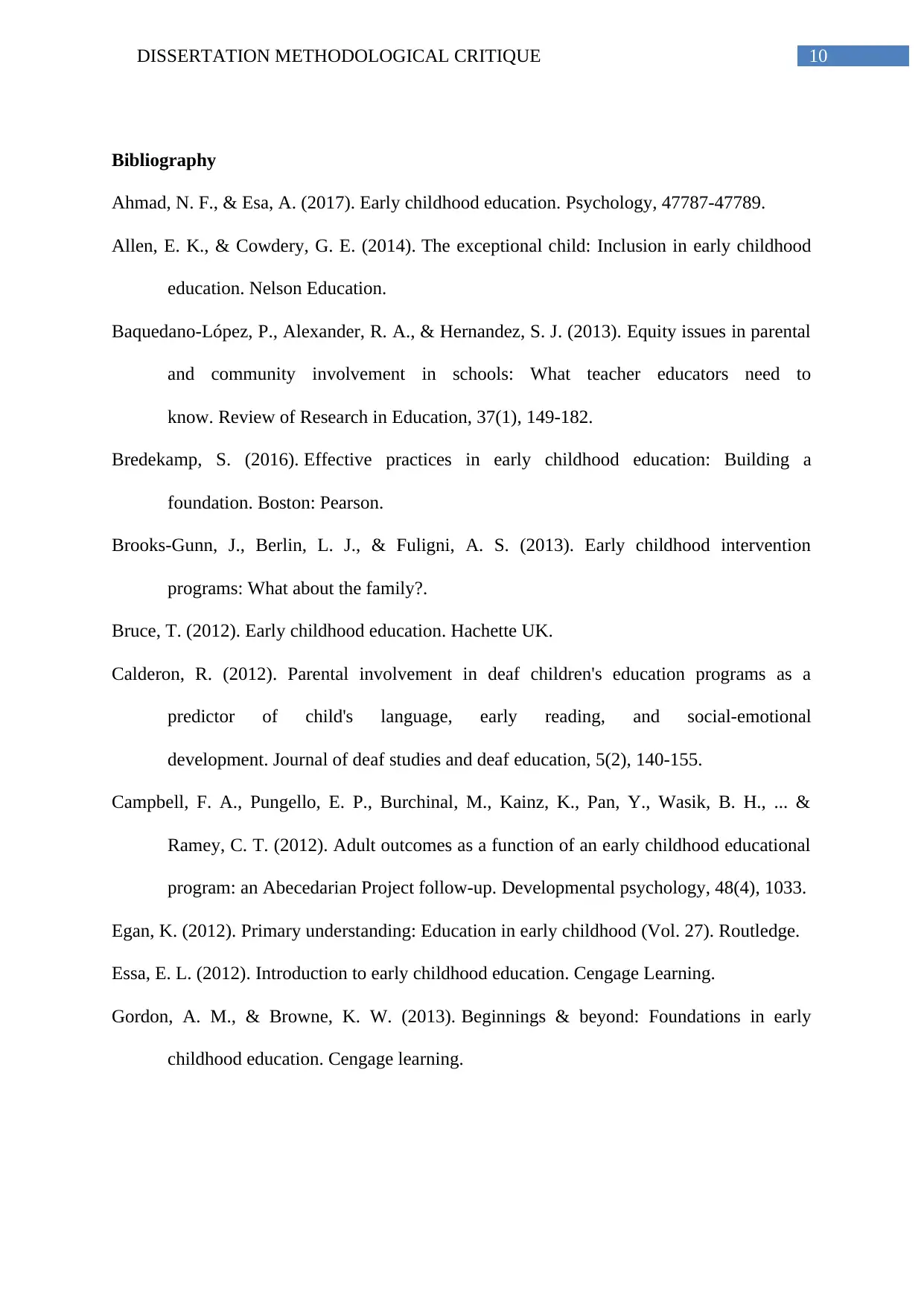
10DISSERTATION METHODOLOGICAL CRITIQUE
Bibliography
Ahmad, N. F., & Esa, A. (2017). Early childhood education. Psychology, 47787-47789.
Allen, E. K., & Cowdery, G. E. (2014). The exceptional child: Inclusion in early childhood
education. Nelson Education.
Baquedano-López, P., Alexander, R. A., & Hernandez, S. J. (2013). Equity issues in parental
and community involvement in schools: What teacher educators need to
know. Review of Research in Education, 37(1), 149-182.
Bredekamp, S. (2016). Effective practices in early childhood education: Building a
foundation. Boston: Pearson.
Brooks-Gunn, J., Berlin, L. J., & Fuligni, A. S. (2013). Early childhood intervention
programs: What about the family?.
Bruce, T. (2012). Early childhood education. Hachette UK.
Calderon, R. (2012). Parental involvement in deaf children's education programs as a
predictor of child's language, early reading, and social-emotional
development. Journal of deaf studies and deaf education, 5(2), 140-155.
Campbell, F. A., Pungello, E. P., Burchinal, M., Kainz, K., Pan, Y., Wasik, B. H., ... &
Ramey, C. T. (2012). Adult outcomes as a function of an early childhood educational
program: an Abecedarian Project follow-up. Developmental psychology, 48(4), 1033.
Egan, K. (2012). Primary understanding: Education in early childhood (Vol. 27). Routledge.
Essa, E. L. (2012). Introduction to early childhood education. Cengage Learning.
Gordon, A. M., & Browne, K. W. (2013). Beginnings & beyond: Foundations in early
childhood education. Cengage learning.
Bibliography
Ahmad, N. F., & Esa, A. (2017). Early childhood education. Psychology, 47787-47789.
Allen, E. K., & Cowdery, G. E. (2014). The exceptional child: Inclusion in early childhood
education. Nelson Education.
Baquedano-López, P., Alexander, R. A., & Hernandez, S. J. (2013). Equity issues in parental
and community involvement in schools: What teacher educators need to
know. Review of Research in Education, 37(1), 149-182.
Bredekamp, S. (2016). Effective practices in early childhood education: Building a
foundation. Boston: Pearson.
Brooks-Gunn, J., Berlin, L. J., & Fuligni, A. S. (2013). Early childhood intervention
programs: What about the family?.
Bruce, T. (2012). Early childhood education. Hachette UK.
Calderon, R. (2012). Parental involvement in deaf children's education programs as a
predictor of child's language, early reading, and social-emotional
development. Journal of deaf studies and deaf education, 5(2), 140-155.
Campbell, F. A., Pungello, E. P., Burchinal, M., Kainz, K., Pan, Y., Wasik, B. H., ... &
Ramey, C. T. (2012). Adult outcomes as a function of an early childhood educational
program: an Abecedarian Project follow-up. Developmental psychology, 48(4), 1033.
Egan, K. (2012). Primary understanding: Education in early childhood (Vol. 27). Routledge.
Essa, E. L. (2012). Introduction to early childhood education. Cengage Learning.
Gordon, A. M., & Browne, K. W. (2013). Beginnings & beyond: Foundations in early
childhood education. Cengage learning.
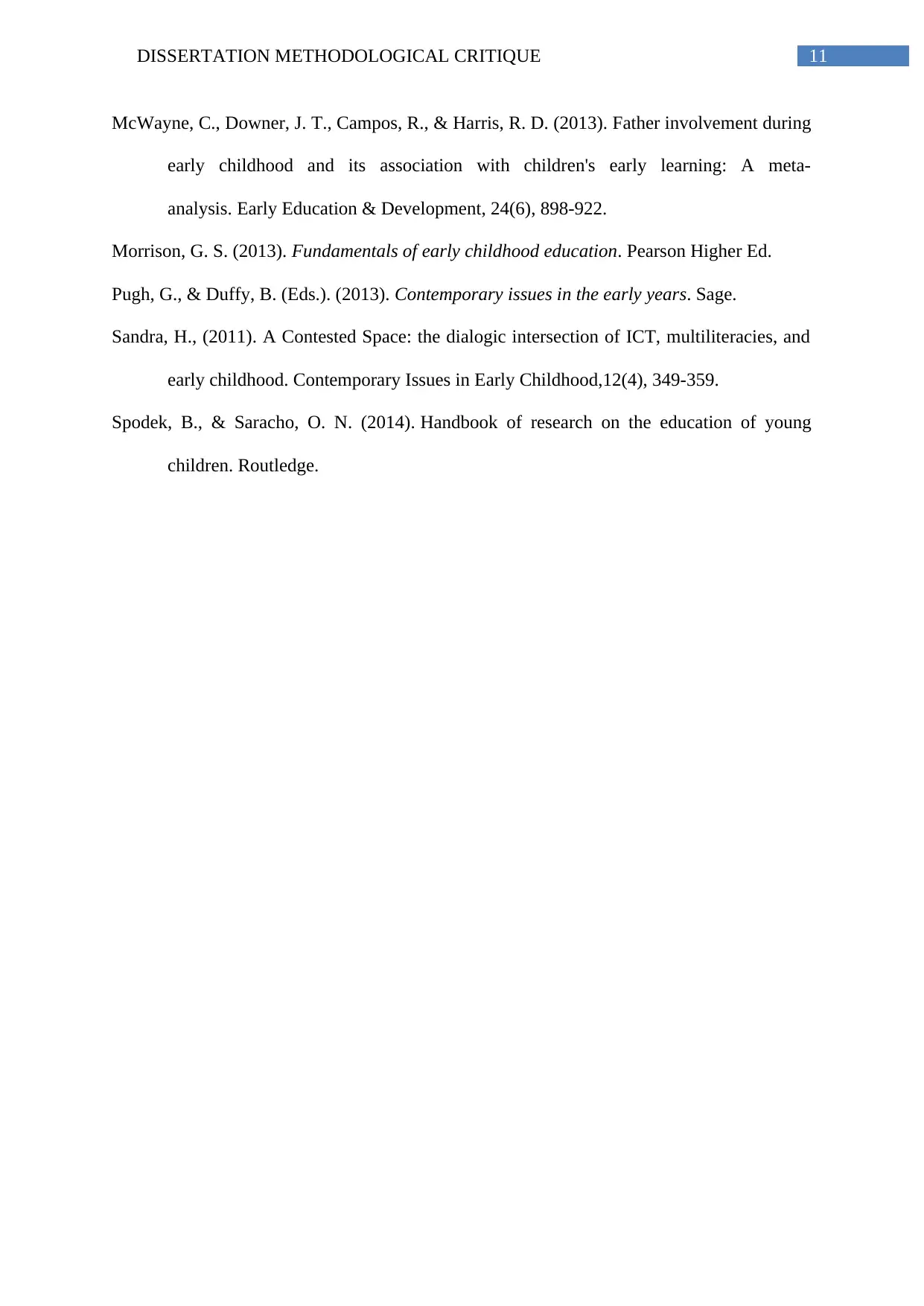
11DISSERTATION METHODOLOGICAL CRITIQUE
McWayne, C., Downer, J. T., Campos, R., & Harris, R. D. (2013). Father involvement during
early childhood and its association with children's early learning: A meta-
analysis. Early Education & Development, 24(6), 898-922.
Morrison, G. S. (2013). Fundamentals of early childhood education. Pearson Higher Ed.
Pugh, G., & Duffy, B. (Eds.). (2013). Contemporary issues in the early years. Sage.
Sandra, H., (2011). A Contested Space: the dialogic intersection of ICT, multiliteracies, and
early childhood. Contemporary Issues in Early Childhood,12(4), 349-359.
Spodek, B., & Saracho, O. N. (2014). Handbook of research on the education of young
children. Routledge.
McWayne, C., Downer, J. T., Campos, R., & Harris, R. D. (2013). Father involvement during
early childhood and its association with children's early learning: A meta-
analysis. Early Education & Development, 24(6), 898-922.
Morrison, G. S. (2013). Fundamentals of early childhood education. Pearson Higher Ed.
Pugh, G., & Duffy, B. (Eds.). (2013). Contemporary issues in the early years. Sage.
Sandra, H., (2011). A Contested Space: the dialogic intersection of ICT, multiliteracies, and
early childhood. Contemporary Issues in Early Childhood,12(4), 349-359.
Spodek, B., & Saracho, O. N. (2014). Handbook of research on the education of young
children. Routledge.
⊘ This is a preview!⊘
Do you want full access?
Subscribe today to unlock all pages.

Trusted by 1+ million students worldwide
1 out of 12
Related Documents
Your All-in-One AI-Powered Toolkit for Academic Success.
+13062052269
info@desklib.com
Available 24*7 on WhatsApp / Email
![[object Object]](/_next/static/media/star-bottom.7253800d.svg)
Unlock your academic potential
Copyright © 2020–2026 A2Z Services. All Rights Reserved. Developed and managed by ZUCOL.



